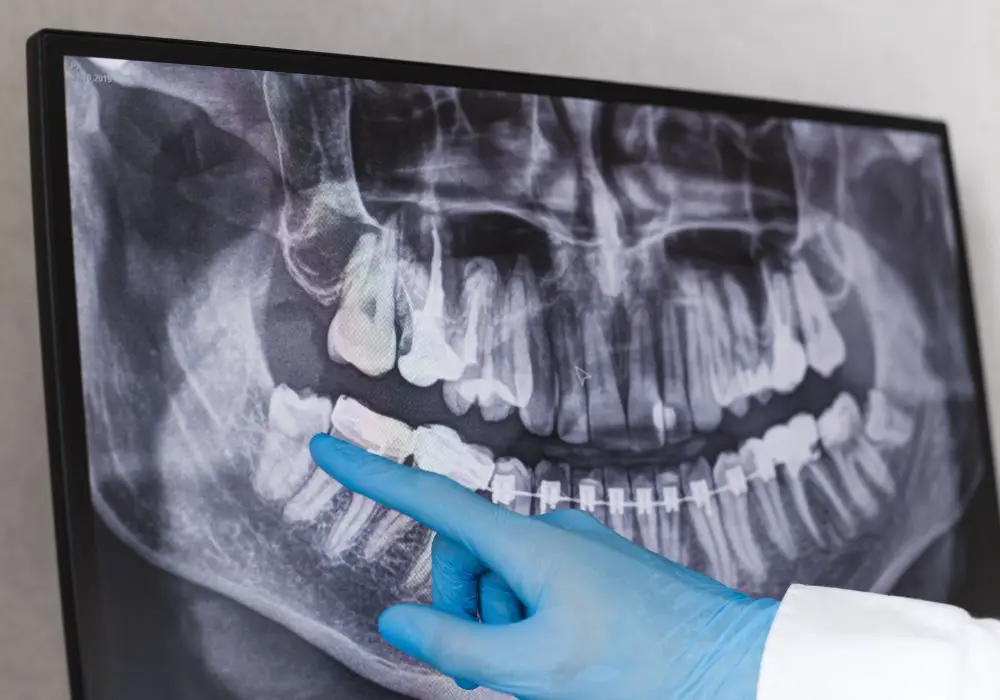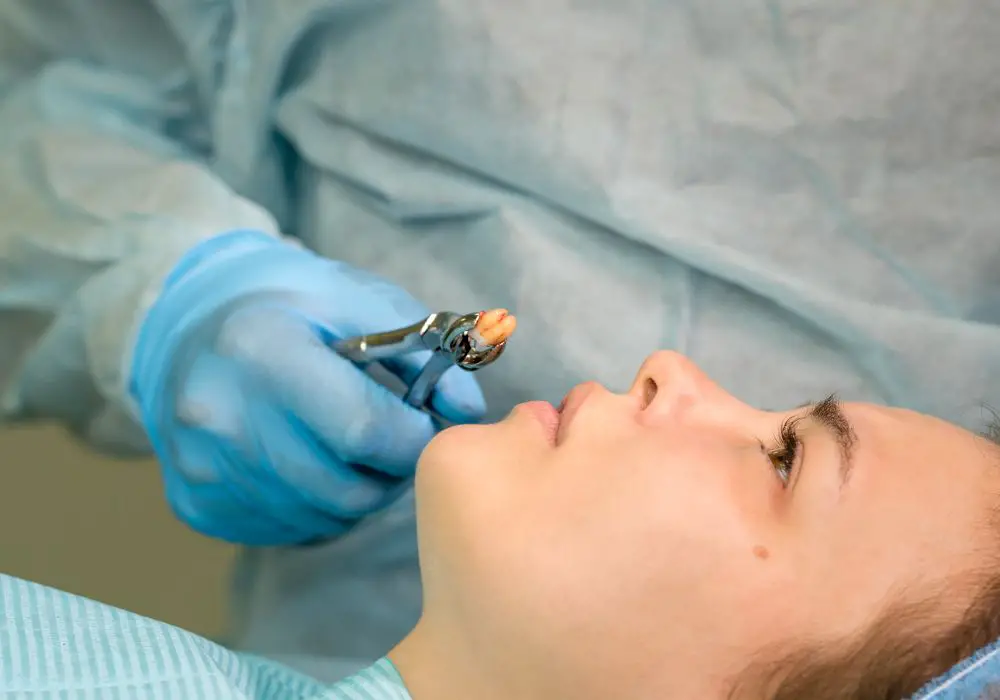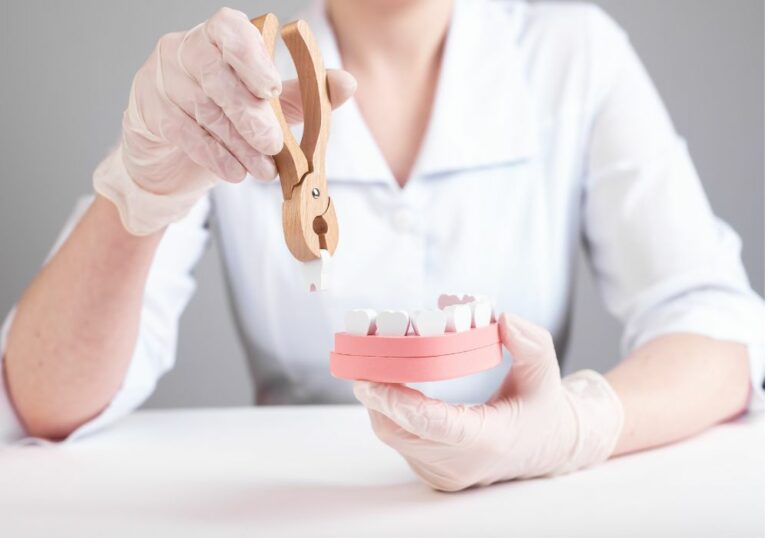Having wisdom teeth, also known as third molars, is a common occurrence for most people. But what about having 8 wisdom teeth? Is this a typical amount or considered excessive? Let’s take a closer look at the facts around wisdom teeth and what it means to have 8 of them.
What are Wisdom Teeth?

Wisdom teeth are the third and final set of molars that emerge during late adolescence or early adulthood, typically between the ages of 17 to 25. Most people have 4 wisdom teeth – one in each corner of the mouth. They are positioned furthest back in the mouth behind the second molars.
The term “wisdom tooth” comes from the fact that they erupt at an older age when a person has gained more wisdom. However, in modern times wisdom teeth have become synonymous with problems and are often extracted if room in the mouth is insufficient.
The Role and Impact of Wisdom Teeth

Wisdom teeth were useful for our ancestors who had coarse, abrasive diets including roots, nuts, meats and grains. The extra molars helped them chew and process food efficiently.
However, human diets and jaws have evolved since then. Soft, processed foods do not require intensive chewing from third molars. Insufficient room can cause wisdom teeth to become impacted, only partially emerging or getting stuck below the gums. Impaction leads to pain, swelling and increased risk for infection or decay in surrounding teeth.
For these reasons, many people have their wisdom teeth pulled as a preventative measure. Removing symptomatic wisdom teeth is very common – approximately 85% of young adults have at least one wisdom tooth extraction.
How Many Wisdom Teeth Do People Normally Have?

Most people have 4 wisdom teeth – one in each corner of the mouth. However, the number can vary from person to person due to genetics and environment factors. Here are some general statistics:
- 20-30% have none at all due to becoming impacted and embedded
- 25% have only 1-3 wisdom teeth present
- Less than 5% have more than 4 wisdom teeth
So while 4 wisdom teeth is the most common and considered “normal”, variation from this number is not uncommon. Having extra wisdom teeth typically occurs when there is available space in the jaw behind the second molars.
What Does It Mean to Have 8 Wisdom Teeth?

Having a total of 8 wisdom teeth is quite rare, occurring in less than 5% of the population. Some key points about having 8 wisdom teeth:
- Indicates there is sufficient room in the jaw for additional teeth to emerge
- Often occurs when the jawbone is slightly larger than average
- Can be helpful from an eating perspective if fully erupted and functional
- Higher risk of crowding and impaction if other teeth are out of alignment
- Removal of 8 wisdom teeth is more complex and usually done in multiple stages
In summary, having 8 wisdom teeth simply means extra molars were able to develop and erupt in the mouth. Proper alignment is still important to avoid problems. Monitoring for impaction or decay is recommended.
Determining How Many Wisdom Teeth You Have

If you want to find out how many wisdom teeth you have, get an evaluation from your dentist. Here are some ways they can determine your wisdom tooth count:
- Clinical exam – Visually counting teeth and looking for signs of emerging wisdom teeth
- X-rays – Panoramic x-rays show all areas of teeth and jawbone
- CT scan – 3D image from computed tomography provides detailed anatomy
Your dentist may periodically take x-rays to monitor for wisdom teeth development and emergence. Notify them if you feel additional teeth coming in.
Implications of Having 8 Wisdom Teeth

What does it mean for your dental health if you have 8 wisdom teeth? Here are some potential implications:
Crowding and Misalignment
With more teeth in the mouth, crowding and misalignment is more likely. Crooked positioning can make wisdom teeth more prone to problems.
Higher Impaction Risk
Impaction occurs when a tooth becomes stuck below the gums and cannot properly emerge. Having additional wisdom teeth raises the risk of one or more becoming impacted.
Difficult Extraction Process
If extraction is required, removing 8 wisdom teeth is more complicated than 4. It will likely require multiple appointments to address each quadrant.
Increased Decay Risk
Additional wisdom teeth create more spaces and grooves where plaque and bacteria can accumulate. This boosts the risk of tooth decay or periodontal disease.
Gum Disease
Insufficient room raises the chance of pericoronitis, an inflammation of the gums around partially erupted wisdom teeth. Good oral hygiene is essential.
Ongoing Monitoring
Your dentist will want to monitor your 8 wisdom teeth more closely for potential problems and intervene promptly if needed.
With careful monitoring and good oral hygiene, it is possible to maintain 8 healthy wisdom teeth. However, extraction is often required when issues develop.
Options for Managing 8 Wisdom Teeth

If you have 8 wisdom teeth, here are some management options your dentist may recommend:
- Watchful waiting – Allow wisdom teeth to emerge on their own and monitor for any problems.
- Extraction – Surgically remove any problematic or impacted wisdom teeth.
- Orthodontics – Use braces to create sufficient room for wisdom teeth.
- Sectioning – Separate one large wisdom tooth into smaller sections for easier extraction.
- Coronectomy – Intentionally leave crowns of wisdom teeth embedded to avoid nerve damage.
Your dentist will determine the best approach based on your specific circumstances. The goal is to maintain healthy wisdom teeth if possible, and remove any that present problems.
When to Seek Evaluation for 8 Wisdom Teeth

See your dentist promptly if you notice any of the following signs or symptoms:
- Pain, swelling or discomfort in the back of the mouth
- Inflamed or bleeding gums around a wisdom tooth
- Cysts forming near partially emerged wisdom teeth
- Crowding, shifting or misalignment of existing teeth
- Difficulty opening the mouth or chewing on one side
- Headaches or jaw stiffness
Don’t wait with these symptoms, as they often indicate an impacted or problematic wisdom tooth. Your dentist can assess the situation and determine appropriate management.
What to Expect When Extracting 8 Wisdom Teeth

Extracting 8 wisdom teeth is often necessary when problems develop. Here’s what to expect with the procedure:
Multiple Appointments
Removing all 4 wisdom teeth at once is very traumatic. Extracting 8 is nearly impossible. Your oral surgeon will likely extract the teeth over multiple appointments, typically addressing one quadrant per visit.
IV Sedation
You will be sedated with an IV for a smooth procedure and reduced anxiety. This involves injecting sedative medication into your arm vein.
Local Anesthetic
Local anesthetic will be administered to numb the extraction sites. This involves injections to block sensation in the teeth, gums and nerves.
Tooth Removal
Your surgeon will make incisions and surgically remove each problematic wisdom tooth. They may section large teeth for easier removal.
Stitches
The surgeon will place stitches to close the surgical site for optimal healing. These will resorb over time.
Recovery Time
With IV sedation and extensive extractions, recovery takes 1-2 weeks. Temporary side effects like pain, swelling and bruising are common.
Follow all post-op care instructions from your surgeon to prevent complications. Call your dentist with any concerns.
Key Takeaways on Having 8 Wisdom Teeth

- Having 8 wisdom teeth is uncommon, occurring in less than 5% of people
- Extra wisdom teeth often indicate sufficient jawbone space for more molars
- Potential issues include crowding, impaction, decay and periodontal disease
- See your dentist promptly if you notice any problems developing
- Extracting 8 wisdom teeth is complex and done over multiple visits for recovery
- With careful monitoring and oral hygiene, retaining healthy wisdom teeth may be possible
In summary, having 8 wisdom teeth is not typical but also not alarming on its own. Work closely with your dentist for proper management and maintenance. Prompt extraction can resolve any wisdom teeth problems that may arise.
Frequently Asked Questions About Having 8 Wisdom Teeth
Is it weird to have 8 wisdom teeth?
Having 8 wisdom teeth is quite uncommon, but medically it is not considered “weird” or pathological on its own. As long as your wisdom teeth are healthy and properly aligned, there is no cause for concern. If problems do develop, your dentist can discuss appropriate management options.
Can you have extra wisdom teeth?
Yes, it is possible but uncommon to have additional wisdom teeth beyond the normal 4. This happens when there is available space in the jawbone for more teeth to develop. While rare, some people are able to have up to 8 wisdom teeth.
Is it bad to have 8 wisdom teeth?
Having 8 wisdom teeth does not have to be harmful if the teeth are fully erupted and well-aligned. However, the extra teeth do raise your risk for problems like crowding, impaction and tooth decay. Work closely with your dentist to monitor your wisdom teeth proactively.
Should I remove 8 wisdom teeth?
Your dentist will assess whether removing your 8 wisdom teeth is advisable. If the teeth are symptomatic or impacted, extraction is likely necessary. If wisdom teeth are positioned normally and free of disease, retention may be an option with careful monitoring.
How long does it take to remove 8 wisdom teeth?
It is not advised to extract all 8 wisdom teeth in one visit, as this causes extensive trauma. Your oral surgeon will likely extract the teeth over multiple appointments spaced weeks or months apart for adequate healing. The total process may take around 6 months.
Can I go to work after getting 8 wisdom teeth out?
Expect to take 1-2 weeks off work after surgical extraction of multiple wisdom teeth. Healing takes time and you may experience side effects like pain, swelling, bruising and restricted jaw movement. Returning to work too soon could impair healing or lead to complications.
Why do I have 8 wisdom teeth and no one else does?
A few factors that can contribute to having extra wisdom teeth compared to others include:
- Genetics – Jaw and tooth development is inherited
- Ethnicity – Some ethnic backgrounds are associated with additional teeth
- Jaw size – A slightly larger mandible provides space for more teeth
- Tooth size – Smaller teeth allow more to fit in the jaw
However, in many cases the cause is unknown. Wisdom tooth variation simply represents natural diversity in human anatomy.
Conclusion
While most people have 4 wisdom teeth, possessing 8 third molars is an uncommon anatomical variation that occurs in a small portion of the population. If given sufficient room to grow in the jawbone and maintained with good oral hygiene, 8 wisdom teeth may function just fine. However, the additional teeth do raise risk for issues like crowding, impaction and decay. Work closely with your dentist for appropriate management. Seek prompt evaluation if any symptoms arise indicating a problem. With early intervention, it is often possible to retain some healthy wisdom teeth while extracting those causing issues.
In summary, having 8 wisdom teeth is not typical but does not necessitate removal on its own. Monitor your wisdom teeth carefully and address problems early. With proper maintenance and care, your 8 wisdom teeth may be able to be retained longer-term.






